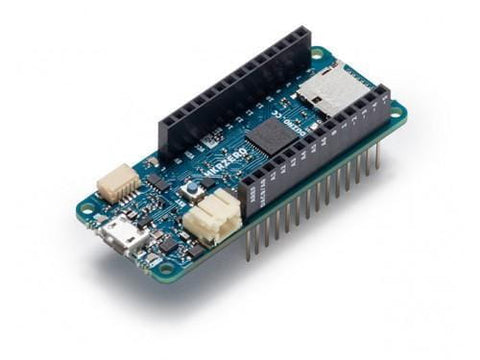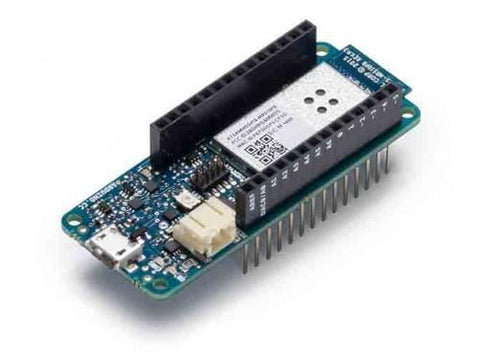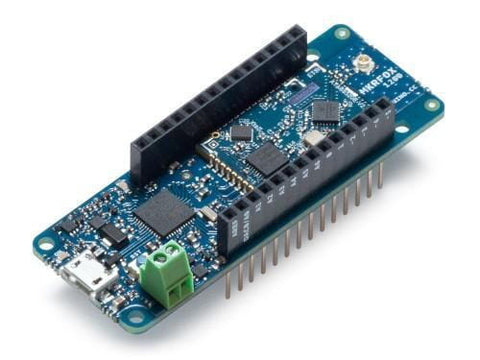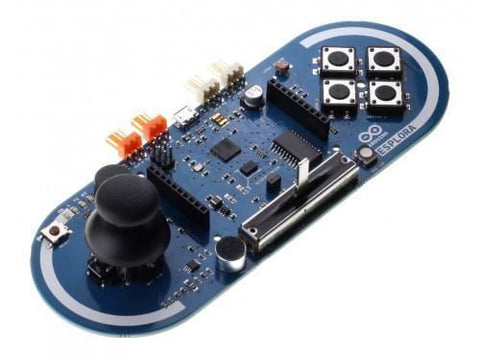We've added lots of new Arduino products recently and it can be hard tell the difference between them all so we thought we'd give you a quick little guide on the differences so you can decide which ones best for your next project. We'll be updating this guide throughout 2018 as we continue to expand our product range with the latest Arduino items available. If you haven't seen it yet we suggest reading our previous Arduino Guide which details all of the most popular boards such as the Uno, Mega and Mini.
 |
The MKR ZERO board acts as a great educational tool for learning about 32-bit application development. It has an on-board SD connector with dedicated SPI interfaces that allows you to play with MUSIC files with no extra hardware! |
 |
This is a powerful board that combines the functionality of the Zero and the Wi-Fi Shield. It is the ideal solution for makers wanting to design IoT projects with minimal previous experience in networking. It's available in two versions one with headers and one without. We also stock the Arduino IoT MKR1000 WIFI Bundle which has everything you'll need to create 5 different IoT based projects. |
 |
Arduino MKR FOX 1200 W/O Antenna: Arduino MKRFOX1200 has been designed to offer a practical and cost effective solution for makers seeking to add SigFox connectivity to their projects with minimal previous experience in networking. |
 |
This device is derived from the Arduino Leonardo. The Esplora differs from all preceding Arduino boards in that it provides a number of built-in, ready-to-use set of onboard sensors for interaction. It's designed for people who want to get up and running with Arduino without having to learn about the electronics first. |
Side by side comparison:
| Model: | MKR ZERO | MKR 1000 | MKR FOX | ESPLORA |
| MCU | SAMD21 Cortex-M0+ 32bit low power ARM MCU | SAMD21 Cortex-M0+ 32bit low power ARM MCU | SAMD21 Cortex-M0+ 32bit low power ARM MCU | ATmega32u4 |
| Clock Speed | 32.768 kHz (RTC), 48 MHz | 32.768 kHz (RTC), 48 MHz | 32.768 kHz (RTC), 48 MHz | 16 MHz |
| Flash Memory | 256 KB |
256 KB Bootloader: 8 KB |
256 KB | 32KB Bootloader uses 4KB |
| SRAM | 32 KB | 32 KB | 32KB | 2.5 KB |
| EEPROM | No | No | No | 1 KB |
| Digital I/O Pins | 8 | 8 | 8 | - |
| PWM Pins | 12 | 12 | 12 | - |
| Analogue Input Pins | 7 | 7 | 7 | - |
| Analogue Output Pins | 1 | 1 | 1 | - |
| Wireless Connectivity | - | WiFi |
SigFox Carrier frequency: 868 MHz |
- |
| I/O Ports/Devices |
1 x LED 1 x Reset Button 1 x JST PH Connector 1 x Micro USB Port 1 x microSD Card Slot 1 x I2C Connector (small form factor 5-pin connector with 1.0mm pitch) |
1 x LED 1 x Reset Button 1 x JST PH Connector 1 x Micro USB Port |
1 x LED 1 x Reset Button 1 x 2-Pin Screw Terminal Connector 1 x Micro USB Port 1 x uFL Antenna Connection |
1 x Reset Button 1 x Buzzer 1 x Joystick with push button 1 x TFT Screen Connector 1 x Microphone 1 x Linear Potentiometer 1 x Temperature Sensor 1 x RGB LED 1 x 3-Axis Accelerometer 2 x Output Tinkerkit Connectors 2 x Input Tinkerkit Connectors 1 x Micro USB Port 1 x LDR 4 x Push Buttons |
| I2C | 1 | 1 | 1 | - |
|
SPI |
1 | 1 | 1 | Via TFT Connector |
| UART | 1 | 1 | 1 | - |
| Battery Support | Li-Po single cell, 3.7V, 700mAh min | Li-Po single cell, 3.7V, 700mAh min | 2x AA or AAA | - |
If you have any further questions about the items discussed here or anything else please don't hesitate to contact us and we'll do our best to help you as much as possible.

